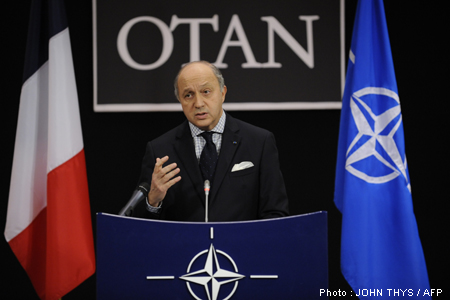
From Laurent Fabius, International Herald Tribune: In 2009, we did not support a return to the integrated command, but there is no question of organizing a permanent to-ing and fro-ing, and there would be little point in leaving it again today. However, we must ensure that our return, now officially endorsed, does not result in a trivialization of our foreign policy or a deterioration of our ability to make decisions and act, but on the contrary, in the growth of our influence and capabilities. . . .
The report [pdf] that the former foreign minister Hubert Védrine has just presented to the French president on our country’s role in NATO is a highly useful contribution to the work of the White Paper Commission tasked with considering our defense and security policy agenda. . . .
1) For France, NATO must remain a special instrument of the trans-Atlantic relationship for the sake of values and interests we share — Europeans on the one hand and Americans and Canadians on the other. NATO is the natural framework for our forces’ joint engagement with the Americans.
In this context, France will act to pursue the reform of the alliance in order to make it more effective. It will continue to shoulder its responsibilities, while preserving autonomy in its fundamental choices: to implement its nuclear deterrent; to withdraw its combat troops from Afghanistan, as it has now done; to develop a NATO anti-missile defense mechanism — for which, at the alliance’s latest summit, President Hollande set out his conditions . . .
2) There must be calm discussion — facilitated by President Obama’s re-election — of a new sharing of security and defense responsibilities between Europeans and Americans. The United States needs a reliable European ally capable of shouldering all its responsibilities. . . .
3) The efforts initiated for Defense Europe must be pursued. NATO can make its contribution, but it is up to the Europeans first of all to work on it among themselves.
This project is consistent with what we are doing to ensure that the European Union has a coordinated foreign policy with the means to make and implement decisions. We must act now toward this end, whereas our country, mobilized these past few years by its return to NATO’s integrated command, has been rather sparing when it comes to the resources devoted to Defense Europe.
We are going to continue working to build support for this project among European institutions and all our European partners, including the British. Defense Minister Jean-Yves Le Drian and I recently hosted a meeting with our German, Italian, Spanish and Polish colleagues in order to make progress, calling on all the member states to join us in developing this project in cooperation with our main partners, who obviously include NATO.
All these approaches must allow France to guarantee its independence and its capacity for action in a new world and at a time when we are facing strong budget constraints. We shall thus be able to remain an “influential power” that is expected to speak out and is listened to and respected.
Laurent Fabius is foreign minister of France. (photo: John Thys/AFP)
Image: afp%2012%206%2012%20Fabius.jpg
